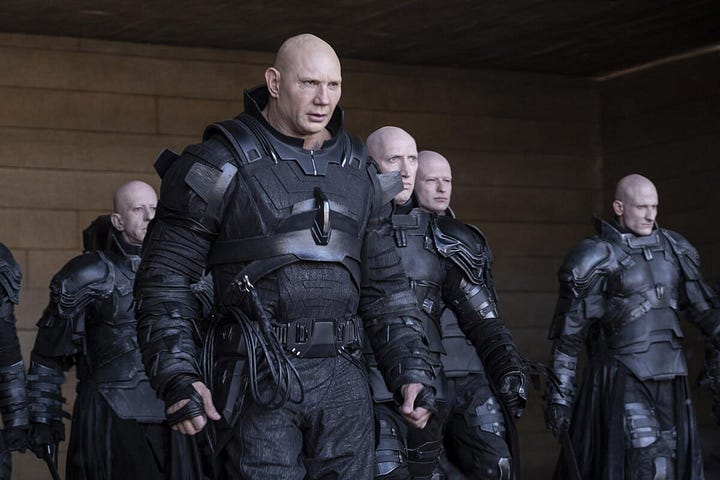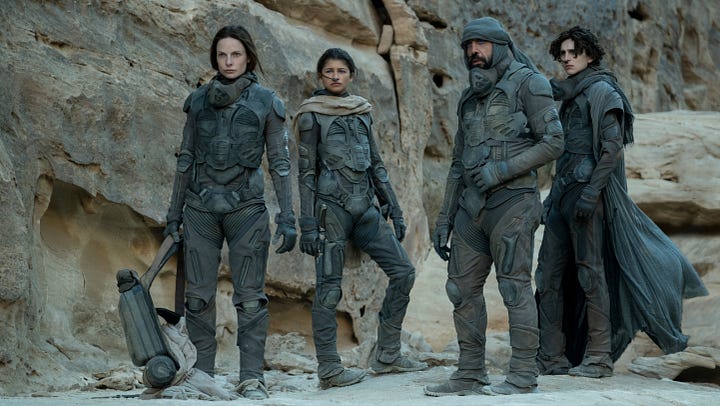The Political Economy of Dune
My most downloaded academic paper on SSRN is a yet to be published book chapter on the political economy of Frank Herbert’s Dune. Do read it here. As Dune Part II is now on our screens (I write this just before going to see it), I thought it was worth revisiting my thoughts on the social science underlying Herbert’s fictional universe. All quotes are from my paper unless otherwise noted.
We should first ask: do fictional universes need a political economy that makes sense? Absolutely not. But to have lasting value, I think it helps that they at least ask important political economy questions.
An episode of the Rest is History, Romans in Space: Star Wars, Dune and Beyond touch on these issues. Holland and Sandbrook note that the original Star Wars trilogy were given a patina of sophistication and historical depth by references to the “old republic” and the “senate”. Star Wars didn’t have a coherent political economy, but these hints gave viewers enough material to reconstruct their own imaginary histories. The problem with the prequel trilogy (the dire Disney remakes have different problems) is that they filled in the backstory and they did so in a particularly flat and inept way.
Unlike many works of science fiction, Dune asks important questions about the nature of political leadership and the relationship between religion and the state. Here I focus on the difficulty of political leadership.
Paul Atreides is the quintessential “great man”. One of what the 19th century historian Thomas Carlyle called
“. . . the leaders of men, these great ones; the modellers, patterners, and in a wide sense creators, of whatsoever the general mass of men contrived to do or to attain; all things that we see standing accomplished in the world are properly the outer material result, the practical realisation and embodiment, of Thoughts that dwelt in the Great Men sent into the world : the soul of the whole world’s history, it may justly be considered, were the history of these" (Carlyle, 1941).
Paul though is not so much Alexander or Napoleon. Rather he is a combination of Muhammad and King Arthur (thanks again to Holland and Sandbrook for this comparison). He is not only an outstanding warrior and leader of men, he has powers of prophecy and foreknowledge (both secular - those of a mentat - and supernatural due his breeding and Bene Gesserit training).
As is well known, Herbert constructed Paul’s narrative under the influence of Joseph Campbell’s The Hero of a Thousand Faces. According to Campbell, many or even most human societies have a common hero narrative: a young man is forced by difficult circumstances to leave his home, embark on a quest in a strange and alien land, and face a great struggle from which they emerge victorious.
The intellectual depth of Dune as a novel comes from Herbert asking: what happens to a society that gets its great man or hero? Herbert’s answer is
“No more terrible disaster could befall your people than for them to fall into the hands of a Hero”
This is why David Lynch’s 1984 adaptation fails. In that adaption Paul really is the promised one: his victory makes it rain on Arrakis. There is no sense of the tragedy that inevitably accompanies a fulfilled prophecy.
So why does Paul fail? I would argue that he inevitably fails because he cannot overcome fundamental institutional and geopolitical constraints that he confronts. While this is, of course, the message of Dune Messiah, more can be said about these institutional constraints.
The political economy of the galactic empire is a form of what Douglass North, John Wallis, and Barry Weingast term “limited access orders”. Limited access orders are a form of government that achieve a measure of peace and society order through the creation of economic rents for elites:
Limited access orders constrain violence and produce political order through the creation and maintenance of economic rents. But the process through which these rents are generated rents is costly. It typically involves the creation of monopolies and hence produces both deadweight losses in the wider economy and a competition for the control of the rents themselves
The greatest source of rents is the spice that can only be harvested on Arrakis.
The analogy between oil and spice is obvious. The spice is essential for space travel. But harvesting it is extremely capital intensive - requiring huge haulers and other specialized equipment - and dangerous for the crew. It is thus a monopoly granted to whichever House holds Arrakis in fief.
Like oil riches, spice produces a resource curse. It leads to the concentration of autocratic power both on the planet and in the galaxy at large. While Harkonnen rule is clearly the most oppressive, the Atreides also govern the planet in an authoritarian manner. The empire Paul conquers following his victory at the end of the first novel is at least as oppressive and even more violent than the previous Corrino empire.
In Herbert’s novels, history follows cyclical laws which humans can bend but not overcome. The Fremen freedom fighters are destined to become invaders and oppressors of other planets. Ecological and geographic factors weigh heavily as does Herbert’s Jungian understand of human psychology and myth. Together this saves the novel from being pure escapism.


As I note in my article, we can view the Harkonnens and the Fremen as representing two polar forms of organization. The Harkonnen represent the brutal leviathan state. They are associated with slavery, torture, and oppression. Through history despotisms, such as that of the Harkonnen’s, have been a common though extreme form of government.
In contrast, the Fremen represent a society without a state. Far from being a libertarian utopia, however, life without a state is dominated by custom (“water debt”, “the bond of water” etc.). And Fremen customs are harsh and unforgiving as the desert of Arrakis.
The Atreides, particularly Duke Leto, offer a possible middle ground. I think of this as roughly corresponding to Daron Acemoglu and James Robinson call “the narrow corridor” between rule by society and rule by the state. As I have noted, the Atreides do not rule via democracy, but they do appear to offer a more liberal and less coercive form of government. It is this promise for the people of Arrakis—and the promise of Paul, as a future duke ruling in his father’s style—that provides a sense of optimism and hope amid the building dread of the hoping half of Dune.
In Dune Messiah, however, and in the other sequels, this sense of hope is shattered. The liberation offered by Paul results in a new and insidious theocratic despotism.
This can explain why Dune is so popular whereas the sequels that Herbert wrote have a much smaller and more niche following. The former provides a conventional heoric narrative. In the latter, structural and societal forces dominate, and the consequences of Paul’s heroic quest are transitory or malign.




On your first point about whether fictional worlds need to have a coherent political economy. In my high school senior thesis (which I posted here https://theeconplayground.com/2016/12/17/economics-and-plot-vol-1-theory/).
A story coherent with the basics of economic theory (actions flow from preferences, constraints, and information), is necessary to have the plot of the story make any sense. Otherwise, it would be like painting with ultraviolent or infared paint. Rational choice approaches to human behavior then can be considered the proposition that the real world has no plot holes.
This is a good essay. How much of it would come across to someone who only saw the new Dune movie?